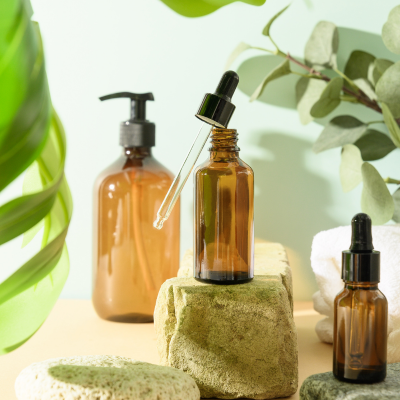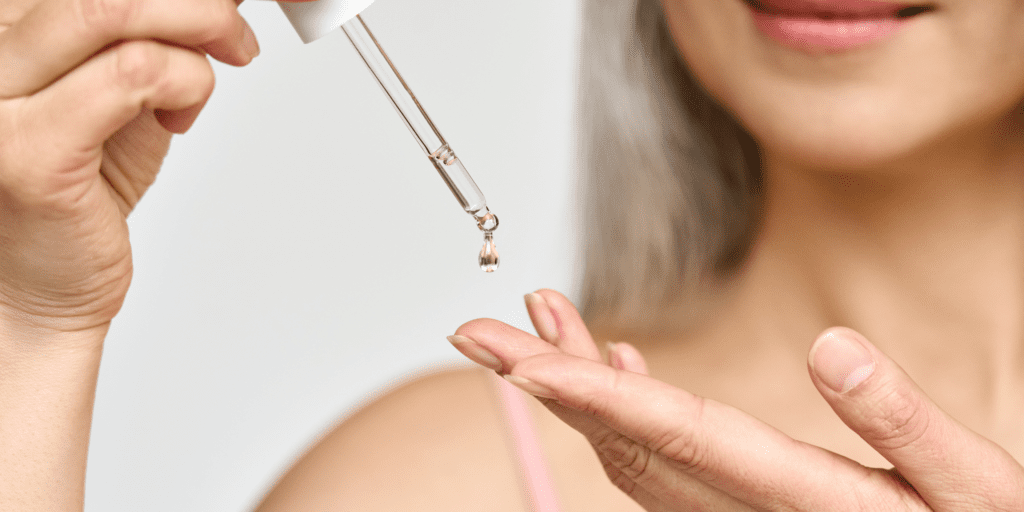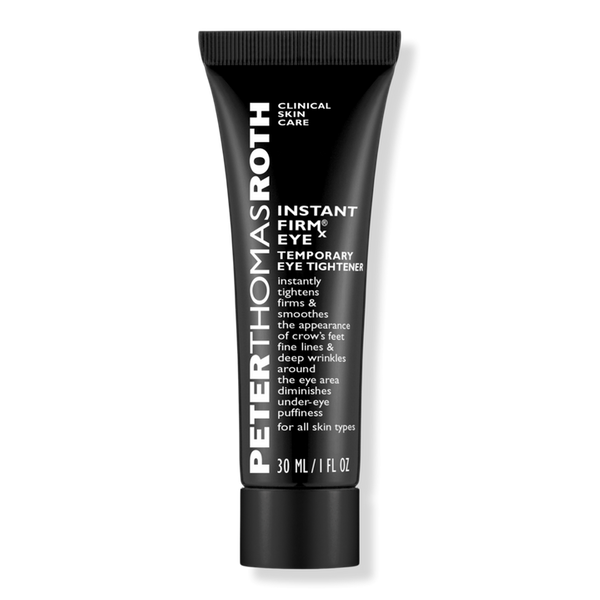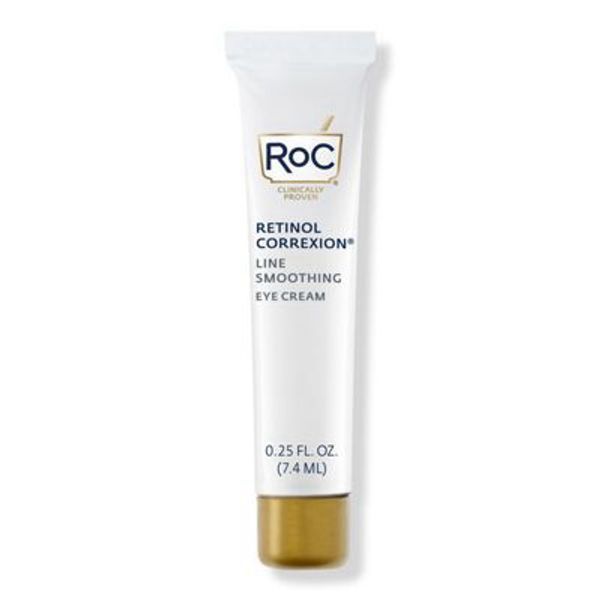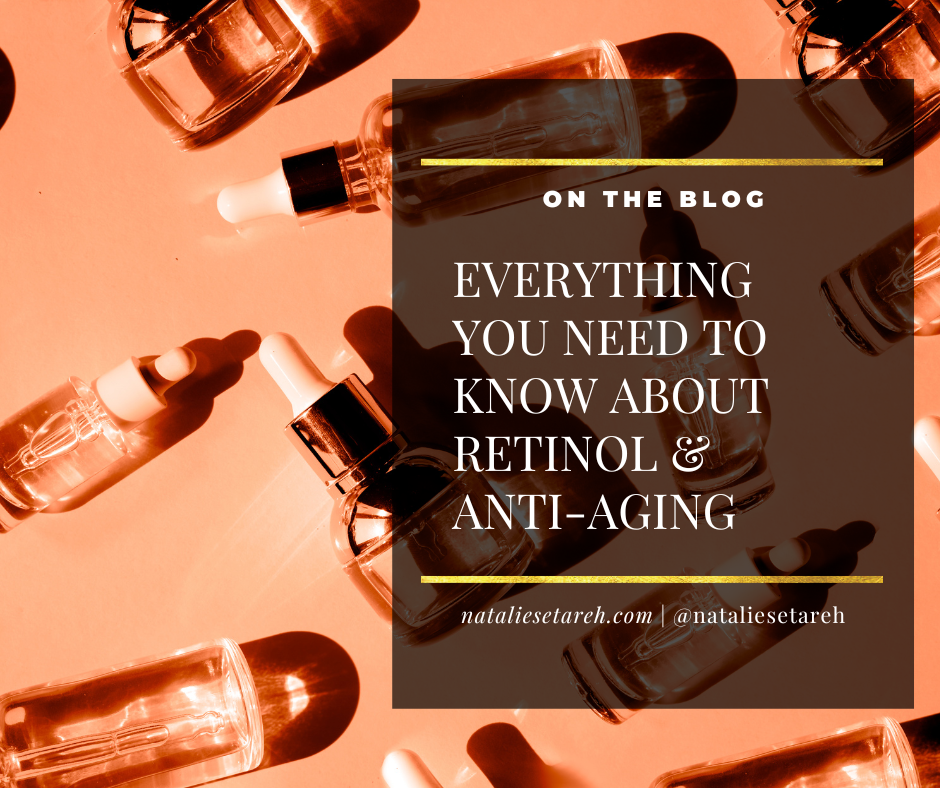
Hey! Before we get started, I just wanted to let you know that this post may contain affiliate links. What does that mean? If you click on one of the links and make a purchase, I may receive a small commission at no extra cost to you.
Don’t worry, I only recommend products that I love. If you want to learn more about how I use affiliate links, be sure to check out my privacy policy. Thanks for supporting this blog!
The world of beauty inundates us with so many skincare and cosmetic products and ingredients that promise to give us our best skin yet. One ingredient that has stood the test of time and has been proven to be effective in reducing the signs of aging (which is that even a bad thing?) is retinol.
I’m Natalie Setareh. A makeup artist and educator. author of the book, Be Your Own Makeup Artist. I like to produce informational and educational content to help you learn how to wear makeup in a way that works for you as well as make educated and confident decisions in your beauty product purchases. Educated consumption leads to less wasted money, less materiel waste, and less stress!
So today, I’m going teach you everything you need to know about retinol. By the end of the article, you’ll make the educated decision as to whether retinol is something to incorporate into your skincare routine.
What Is A Retinol?
Retinol is a skincare ingredient that has been around for decades and has over time become more and more popular and accessible.
But at it’s core, retinol is a derivative of vitamin A.
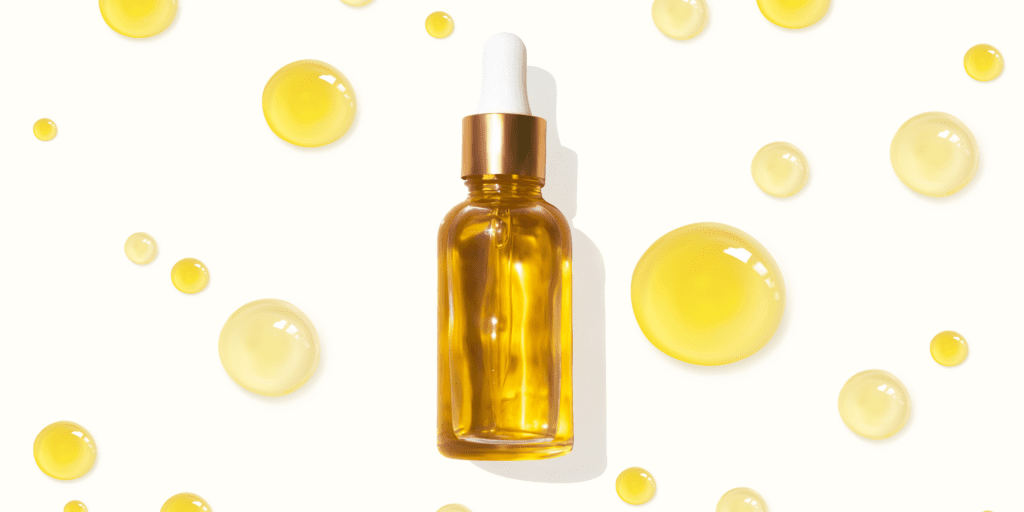
What Is The Difference Between a Retinol and Retinoid?
Retinol and retinoid are often used interchangeably, but there is a difference between the two. Retinol is a specific type of retinoid, while retinoid is a general term for all vitamin A derivatives.
Retinol is the weakest form of retinoid, but it is also the most gentle and least likely to cause irritation. You can buy retinols over the counter!
Retinoids, such as tretinoin and isotretinoin, are stronger and more effective, but they are also more likely to cause side effects. These need to be prescribed by a doctor of dermatology.
What are the benefits of using retinol?
Retinol is known for its effectiveness in treating a variety of skin concerns, to include:
- reducing the appearance of fine lines and wrinkles
- fading age spots and hyperpigmentation
- evening out skin tone and texture
- improving skin elasticity
- promoting collagen production
- reducing the appearance of pores
- treating acne
- reducing inflammation
- smoothing the skin
- brightening of the skin
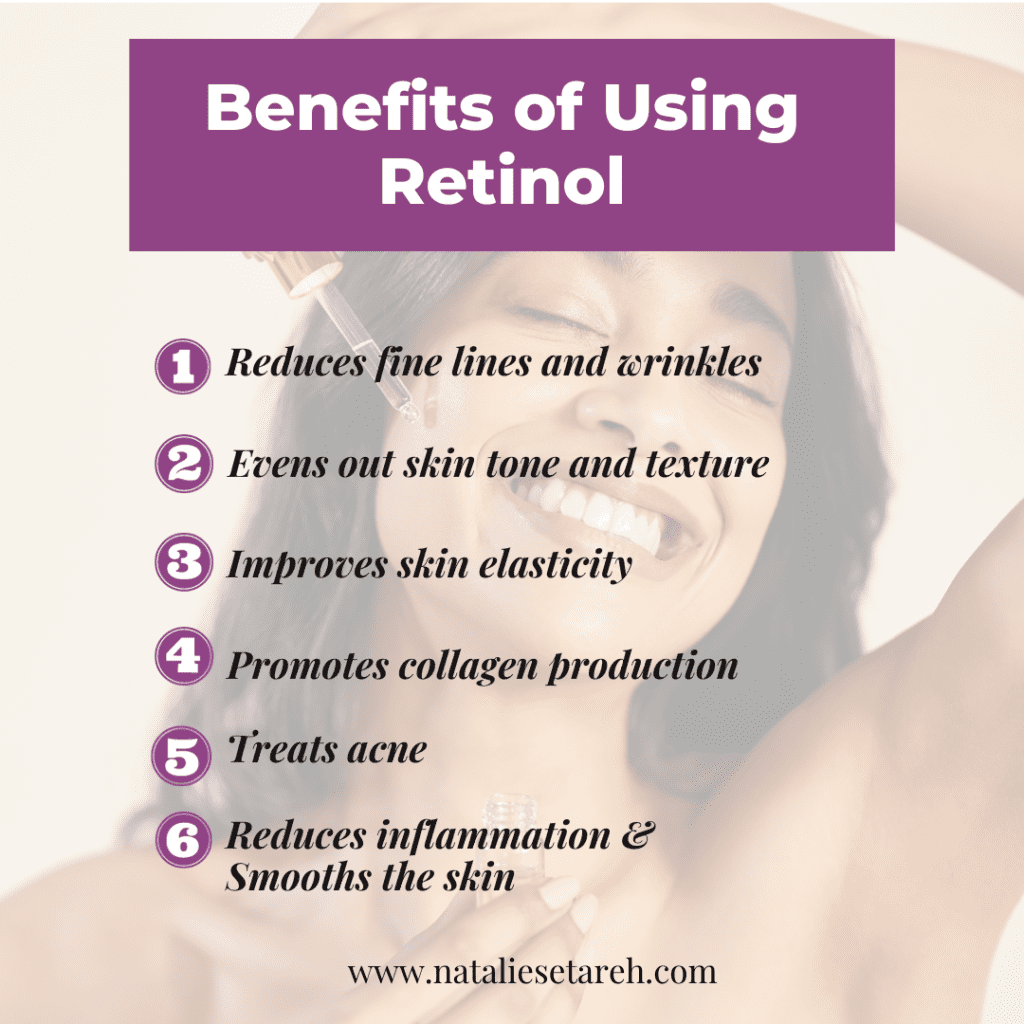
Are retinoids too good to be true?
On average, it can take several weeks (4-8 weeks) or even months (3-4 months) with consistent use to see results from using retinol. This is because retinol works by stimulating the production of new collagen and elastin, and this process takes time.
The amount of time it takes to see results will vary depending on the following factors:
- The concentration of retinol in the product you are using: A high concentration produces results more quickly, but they can also be more irritating.
- Your skin type: People with oily or combination skin tend to see results more quickly than people with dry skin.
- Your age: Younger people tend to see results more quickly than older people.
- The severity of your skin concerns.
Possible Negative Side Effects Of Retinol Use
So that little retinol sample you received? While you definitely won’t know by that sample size if it’s going to work for you in the long-term, you may quickly identify some side effects (because yes, there are side effects).
Some of the common side effects from retinol include:
- Dryness
- Redness
- Peeling
- Flaking
- Itching
- Burning
- Stinging
- Irritation
- Sun sensitivity
In order to minimize some of the side effects of retinol, I suggest finding a retinol pairing that works for your skin type and skin concerns.
You can also minimize side effects from retinol by:
- Starting with a lower percentage of retinol and gradually increasing the percentage as your skin becomes more tolerant.
- Only applying retinol at night, as it can make your skin more sensitive to the sun.
- Wearing sunscreen every day, even on cloudy days.
- Avoiding use of retinol on irritated or broken skin.
If retinol still doesn’t work for you, you can reduce the frequency of use or discontinue use altogether. Don’t worry, there are alternatives to retinol (I’ll get to that next!).
Remember, not all retinol products are created equal. Some products contain higher percentages of retinol than others, and some products may also contain other ingredients that can interact with retinol. It is important to read the label carefully and to choose a retinol product that is appropriate for your skin type and needs.
How & When To Apply Retinol In Your Skincare Routine
As with any new skincare product you purchase, I highly recommend you ** read the directions on the bottle ** The directions will tell you when in your skincare routine to apply the retinol.
However, retinol is most commonly applied in your evening skincare routine on cleansed and dry skin.
As a matter of fact, I recommend most skincare products with active ingredients be used at night only, but that’s just me. And it is also recommended to ‘seal’ in your retinol with your evening moisturizer. Make sure that all the ingredients play nice with one another!
Remember, when you’re first starting out (especially if you have sensitive skin), start by applying it every other night or every two nights (as tolerated)!
What about using retinol during the day? Retinols can make your skin more sensitive to the sun and UV rays, so it is important to avoid using it during the day. The last thing you is even more sun damage!
Do Retinols Work For All Skin Types?
With consistent use, retinols and retinol alternatives, just like all other skin care products, are effective products. Results will always vary. You’re more likely to experience many of the side effects listed above if you’re using a retinol that is not formulated or optimized for your skin type. This also means that your makeup likely won’t wear well or feel comfortable on your face either.
If you want to quickly determine your skin type and get some example skincare routines, download my free skin type guide.
Retinol For All Skin Types
What Active Ingredients Pair Best With Retinol?
For moisture retention
- Sodium hyaluronate (a humectant) I recommend this one >
For improved penetration
- Butylene glycol (a humectant) I recommend this one >
For free radical damage protection?
- Vitamin E I recommend this one >
- Tocopheryl acetate (another form of vitamin E) I recommend this one >
For soothing?
- Coconut oil (please don’t use the coconut oil in your pantry) I recommend this one >
- Cocoa butter I recommend this one >
For sensitive skin?
- Cetearyl alcohol: A non-comedogenic fatty alcohol that is used as an emulsifier and thickener in skincare products. I recommend this one >
- Stearyl alcohol: Also a non-comedogenic fatty alcohol that is used as an emulsifier and thickener. I recommend this one >
For collagen-boosting?
- Hydrolyzed collagen: A smaller form of collagen that can be absorbed into the skin. I recommend this one >
- Palmitoyl pentapeptide-4 (a peptide) I recommend this one >
Again, what other skincare products and moisturizers to pair with these retinols really depends again on your specific skin type and skin concerns. These are general recommendations. For personalized shopping and recommendations, consider booking a consultation here.
Are Retinols Safe To Use On The Eye Area?
There are retinols that are safe (through clinical trials) and specifically formulated for use on the eye area and of course, based on your skin type.
Here are some of my favorite retinols for the eye area depending on your skin type and/or concerns:
These patches all contain retinol, as well as other beneficial ingredients such as hyaluronic acid, niacinamide, and peptides. They can help to reduce the appearance of fine lines and wrinkles, dark circles, and puffiness under the eyes.
For fine lines, normal or normal to dry skin…
For extra hydration and oily skin…
For brightening and evening out skin tone, all skin types…
For a little bit of everything, all skin types
Wait, Are There Any Alternatives to Retinol?
It is important to note that no single skincare ingredient is a perfect substitute for retinol.
However, some ingredients provide some of the same benefits and may be a good option for people who are unable to use retinol or who are looking for a gentler alternative. Below I’ve listed some of the retinol alternatives along with a product recommendation.
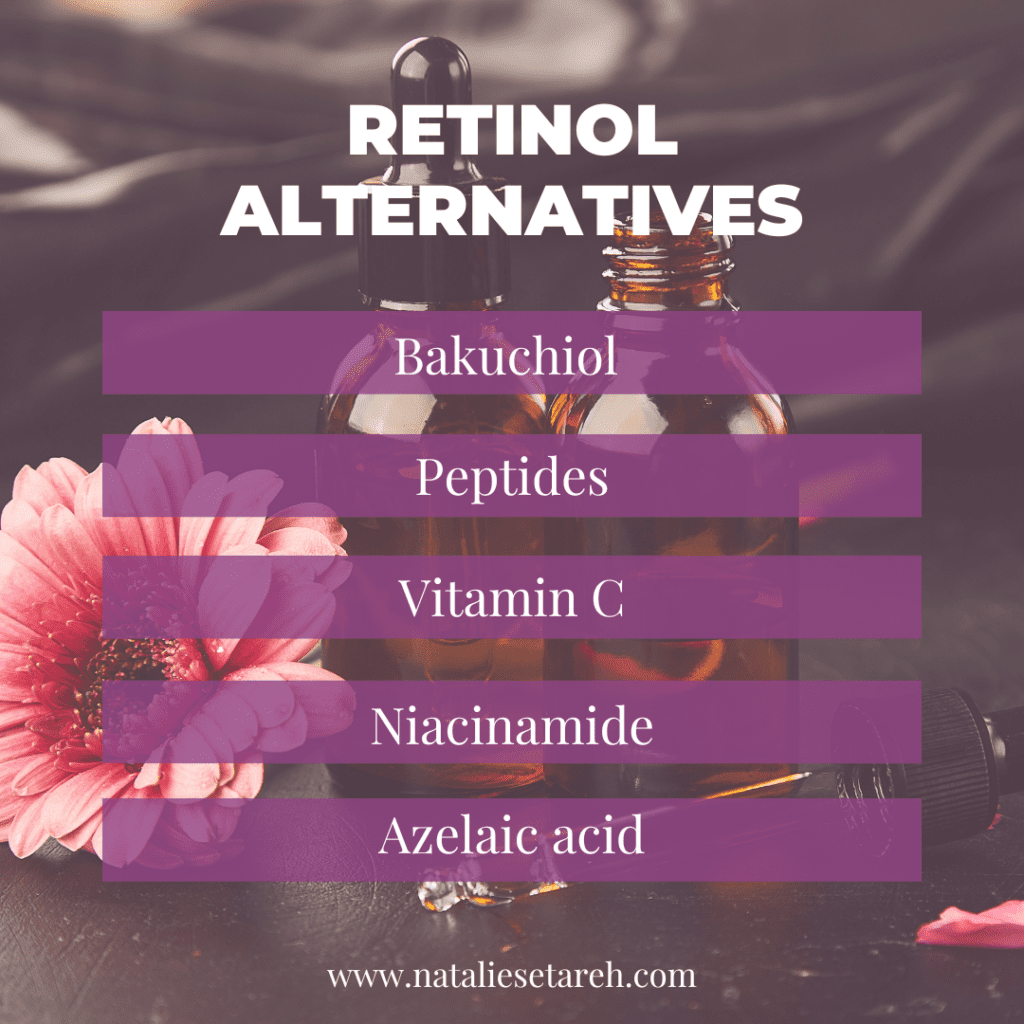
Bakuchiol
Bakuchiol is a plant-based ingredient that has similar effects to retinol, such as improving skin texture, reducing the appearance of fine lines and wrinkles, and fading age spots. Bakuchiol is also less likely to irritate retinol, making it a good choice for people with sensitive skin. Here’s one I recommend >
Peptides
Peptides are short chains of amino acids that can help to stimulate collagen production and reduce the appearance of wrinkles. Peptides are generally gentle and well-tolerated by most skin types. Here’s one I recommend >
Vitamin C
Vitamin C is a powerful antioxidant that can help to protect the skin from free radical damage and brighten the complexion. Vitamin C can also help to reduce the appearance of age spots and hyperpigmentation. Here’s one I recommend >
Niacinamide
Niacinamide, also known as vitamin B3, is a versatile ingredient that can help to improve skin texture, reduce the appearance of pores, and brighten the complexion. Niacinamide can also help to strengthen the skin barrier and reduce inflammation. Here’s one I recommend >
Azelaic acid
Azelaic acid is a naturally occurring acid that has antimicrobial and anti-inflammatory properties. Azelaic acid can help to treat acne, hyperpigmentation, and rosacea. Here’s one I recommend >
When it comes to retinol, here’s the most important thing to remember!
The best retinol is the one you use consistently!
So… Is Retinol Right For Me?
I hope by now, you have enough information about retinol to make an informed decision. If you’re lost in the sauce, start by downloading my free skin type guide. It will not only help you identify your skin type but also provide skincare routine examples and support.
Beauty is about perception, not about make-up. I think the beginning of all beauty is knowing and liking oneself. You can't put on make-up, or dress yourself, or do you hair with any sort of fun or joy if you're doing it from a position of correction.
kevyn aucoin
